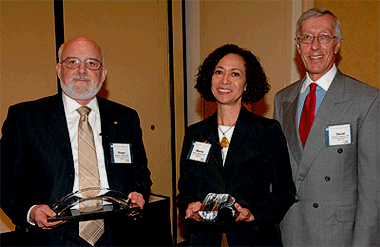 |
 |
 |
|
Recent AREA PublicationsAREA in the NewsRecent AREA PublicationsIn 1996 Congress enacted Moving to Work (MTW), a U.S. Department of Housing and Urban Development (HUD) public housing deregulation demonstration. MTW permits a small number of local and state housing agencies to request, and HUD to grant, waivers of federal statutes or regulations pertaining to the Public Housing and Housing Choice Voucher (HCV) programs. The waivers let the agencies adopt policies or develop programs or procedures that differ from what is allowed and practiced at most housing agencies. Of the 27 active participants in MTW, 13 had imposed time limits on various program benefits, including housing assistance, prior to 2007. For agencies not participating in the MTW demonstration, time limits on housing assistance are not permissible. Normally, housing assistance recipients can keep their Public Housing and HCV benefits as long as they remain income-eligible and abide by program requirements. Whether time limits should be imposed on housing assistance is a controversial and consequential policy question. Some observers maintain that non-time limited assistance ensures that low-income recipients are not deprived of affordable housing. Others, however, contend that having no time limits undermines housing assistance recipients' progression toward self-sufficiency. Also, because demand for public housing units and vouchers exceeds supply, when households retain benefits for long periods of time, the total number of eligible households served is smaller than would be the case if the assistance were time-limited. Hence, the interests of those receiving assistance are juxtaposed with those of equally eligible households not receiving it. This report documents the experiences of the MTW agencies that experimented with time limits on benefits related to housing assistance. AREA in the News AREA, Inc. Executives receive coveted Felt Award: Maxine Mitchell, AREA Inc. President (center), and Robert Miller, AREA Inc. Senior Vice President (left), receive the James Felt Creative Counseling Award of The Counselors of Real Estate (CRE) from David Gleeson, Chairman of the Felt Award Selection Committee. The awards were presented at the 2006 Counselors of Real Estate mid-year meetings in Charleston, SC. CRE Felt Award press release. Learn more about AREA Rents™. AREA Rents™ Award Press Coverage: Multi-Housing World Multi-Housing News Westlaw Housing and Development Reporter National Association of Realtors® RCA Report (2nd pg) The Chicago Tribune quoted AREA, Inc.'s Senior Vice President Robert Miller extensively in a 9/18/05 article on condominium development outside Chicago's central area. Written by Wayne Faulkner, the Tribune Real Estate Editor, the article included Mr. Miller's views on condominium development and sales in neighborhoods as diverse as Albany Park and the Near West Side. Although Chicago is becoming a little less affordable, Mr. Miller believes that the city's condo market has been helped by the fact that it "has been reasonably affordable over the last couple of decades. Younger people began expanding out [from their traditional neighborhoods] to new areas and there was room for prices to go up. Appreciation has been more steady than explosive. "The interesting thing about the supply issue is that as long as the [mortgage interest] rates stay fairly low, so that owning is affordable relative to renting, there will still be some kind of steady demand. From time to time, that supply will get a little ahead, but they [condos] will sell," Mr. Miller concludes. In a recent press release, Illinois Governor Rod R. Blagojevich referred to AREA's economic impact study on the new Illinois biotech campus. The release announced plans for the BIO 2010 conference to be held in Chicago. In its 2005 study, AREA projected that the campus, now in operation in Skokie, IL, will generate $1.8 billion annually and more than 3200 on-site jobs. Read the Governor's complete press release. Chicago Tribune. AREA's comprehensive study on the feasibility of redeveloping a biotech facility in the Chicago suburbs into a biotech park was instrumental in getting the park's development started. In its coverage of the new Illinois Science + Technology Park, the Chicago Tribune quoted AREA's study and reproduced an AREA table of national analysis of biotech parks in "Biotech: Park Opens at Searle Campus," in the Business section of the July 28, 2005 edition. To view this article, go to pqasb.pqarchiver.com and search for "Searle biotech" on July 28, 2005. Two technology websites, The Wisconsin Technology Network and eprairie also covered AREA's study, in an article on the job-creating potential of enhancing biotech in the Midwest, "Creating thousands of jobs, Chicago's biotech space to triple." An AREA, Inc. investigation of neighborhoods surrounding Philadelphia public housing projects revealed that overall property values increased much more in areas where the housing authority invested in ancillary redevelopment activity than in areas where no investment took place. Property values fell in neighborhoods surrounding three older PHA developments where there was no reinvestment. Although median sales prices of owner-occupied housing in Philadelphia rose 55% from 1999 to 2004, in the HOPE VI areas the increase was 142%, indicating the significant impact of the new developments by the Philadelphia Housing Authority. The Philadelphia Public Record covered AREA's study in "Where the Best Real Estate Deals Are." Commercial Real Estate News also discussed the study results. Westlaw Housing and Development Reporter reviewed this study. To attract middle-class buyers and renters, the proportion of low-income families should not exceed 30% to 35% of all households in the new community, according to a study for the CHA by Applied Real Estate Analysis Inc. View the full article at chicagoreporter.com. AREA's evaluation of the federal Youthbuild program found that it is expensive relative to other federally funded programs for disadvantaged youth. AREA compared Youthbuild with Job Corps, JOBSTART, and other programs. The Westlaw Housing and Development Reporter offered details. |
|
|
|
|
|
|
 |